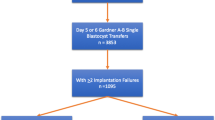Abstract
Objective
To compare the use of enoxaparin alone with combination therapy of prednisone, aspirin and progesterone in the treatment of women with idiopathic recurrent miscarriage (IRM) in terms of live births and pregnancy outcome.
Methods
A prospective, randomized, single-blinded, placebo-controlled trial was conducted at a tertiary referral obstetric hospital. The participants were 170 women with a diagnosis of IRM. Women were recruited after full investigative screening. Women with ≥3 fetal losses and after exclusion of all known causes of recurrent miscarriage were randomly allocated to receive either enoxaparin alone, combination treatment consisting of prednisone, aspirin, and progesterone or placebo. Rates of live births, antenatal complications, delivery and neonatal outcomes were recorded prospectively. Data were statistically analyzed as appropriate.
Results
Ten patients were dropped out after random assignment. Eighty-one percent of the enoxaparin (46/57) group and 85% of the combination-treated group (45/53) were delivered of live infants compared to 48% (24/50) of the placebo (P < 0.05). Women who were treated with combination therapy had a 4.2% higher live birth rate than enoxaparin group. This difference was not significant. Miscarriage rates were significantly lower in the treated groups compared with placebo (P < 0.05). There were no significant differences in late obstetric complications or neonatal mortality between groups.
Conclusions
A combination treatment consisting of high-dose, low-duration prednisone, progesterone and aspirin might be an effective treatment as enoxaparin alone. Both regimens were associated with a good pregnancy outcome.
Similar content being viewed by others
Change history
01 August 2023
An Editorial Expression of Concern to this paper has been published: https://doi.org/10.1007/s00404-023-07159-6
References
Salat-Baroux J (1988) Recurrent spontaneous abortions. Reprod Nutr Dev 28:1555–1568
Geva E, Amit A, Lerner-Geva L, Yaron Y, Daniel Y, Schwartz T (2000) Prednisone and aspirin improve pregnancy rate in patients with reproductive failure and autoimmune antibodies: a prospective study. Am J Reprod Immunol 43(1):36–40
Yokoo T, Takakuwa K, Ooki I, Kikuchi A, Tamura M, Tanaka K (2006) Alteration of TH1 and TH2 cells by intracellular cytokine detection in patients with unexplained recurrent abortion before and after immunotherapy with the husband’s mononuclear cells. Fertil Steril 85(5):1452–1458
Mordechai D, Aida I, Yakov S, Amir W, Benjamin B, Howard C (2006) A randomized study of thromboprophylaxis in women with unexplained consecutive recurrent miscarriages. Fertil Steril 86(2):362–366
Clemens B, Christine K, Eva-Katrin B, Gertrud U, Katharina W, Ullrike C, Johannes C (2006) A combination treatment of prednisone, aspirin, folate, and progesterone in women with idiopathic recurrent miscarriage: a matched-pair study. Fertil Steril 86:145–148
Franssen MT, Korevaar JC, van der Veen F, Boer K, Leschot NJ (2007) Management of recurrent miscarriage: evaluating the impact of a guideline. Hum Reprod 22(5):1298–1303
Liddell HS, Pattison NS, Zanderigo A (1991) Recurrent miscarriage: outcome after supportive care in early pregnancy. Aut N Z J Obstet Gynaecol 31:320–322
Seidman DS, Gale R, Ever-Hadani P, Salter PE, Stevenson DK (1990) Reproductive complications after previous spontaneous abortions. Pediatr Rev Commun 5:1–10
Reginald PW, Beard RW, Chapple J, Forbes PB, Liddel HS, Mowbray JF (1987) Outcome of pregnancies progressing beyond 28 weeks gestation in women with a history of recurrent miscarriage. Br J Obstet Gynaecol 94:643
Jivraj S, Anstie B, Cheong YC, Fairlie FM, Laird SM, Li TC (2001) Obstetric and neonatal outcome in women with a history of recurrent miscarriage: a cohort study. Hum Reprod 16:102–106
Comp PC, Thurnau GR, Welsh J, Esmon CT (1986) Functional and immunologic protein S levels are decreased during pregnancy. Blood 68:881–885
Kruithof EK, Tran-thang C, Gudinchet A, Hauert J, Nicoloso G, Genton C (1987) Fibrinolysis in pregnancy: a study of plasminogen activator inhibitors. Blood 69:460–466
Bates SM, Greer IA, Hirsg J, Ginsberg JS (2004) Use of antithrombotic agents during pregnancy: the seventh ACCP Conference on antithrombotic and thrombolytic therapy [Review]. Chest 126:627s–644s
Downing LJ, Strieter RM, Kadell AM, Wilke CA, Grienfield LJ, Wakefield TW (1998) Low-dose low- molecular-weight heparin is anti-inflammatory during venous thrombosis. J Vasc Surg 28:848–854
Carp HJA (2004) Cytokines in recurrent miscarriage. Lupus 13:630–634
Empson M, Lassere M, Craig JC, Scott JR (2002) Recurrent pregnancy loss: a systematic review of therapeutic trials. Obstet Gynecol 99(1):135–144
Laskin CA, Bombardier C, Hannah ME (1997) Prednisone and aspirin in women with autoantibodies and unexplained recurrent abortion. N Engl J Med 337:148–153
Quenby S, Kalumbi C, Bates M, Farquharson R, Vince G (2006) Prednisolone reduces preconceptual endometrial natural killer cells in women with recurrent miscarriage. Fertil Steril 85(2):538–539
Hill JA, Polgar K, Harlow BL (1992) Evidence of embryo and trophoblastotoxic cellular immune response(s) in women with recurrent spontaneous abortion. Am J Obstet Gynecol 166:1044–1052
Christiansen OB (1996) A fresh look at the causes and treatments of recurrent miscarriage, especially its immunological aspects. Hum Reprod Update 2:271–293
Hauth JC, Goldenberg RI, Parker CR, Cutter GR, Cliver SP (1995) Low-dose aspirin: lack of association with an increase in abruptio placenta or perinatal mortality. Obstet Gynecol 85:1055–1058
Daya S (1989) Efficacy of progesterone support for pregnancy in women with recurrent miscarriage. A meta-analysis of controlled trials. Br J Obstet Gynaecol 96(3):275–280
Goldstein P, Berrier J, Rosen S, Sacks HS, Chalmers TC (1989) A meta analysis of randomized control trials of progestational agents in pregnancy. Br J Obstet Gynaecol 96(3):265–274
Author information
Authors and Affiliations
Corresponding author
Rights and permissions
About this article
Cite this article
Fawzy, M., Shokeir, T., El-Tatongy, M. et al. Treatment options and pregnancy outcome in women with idiopathic recurrent miscarriage: a randomized placebo-controlled study. Arch Gynecol Obstet 278, 33–38 (2008). https://doi.org/10.1007/s00404-007-0527-x
Received:
Accepted:
Published:
Issue Date:
DOI: https://doi.org/10.1007/s00404-007-0527-x




